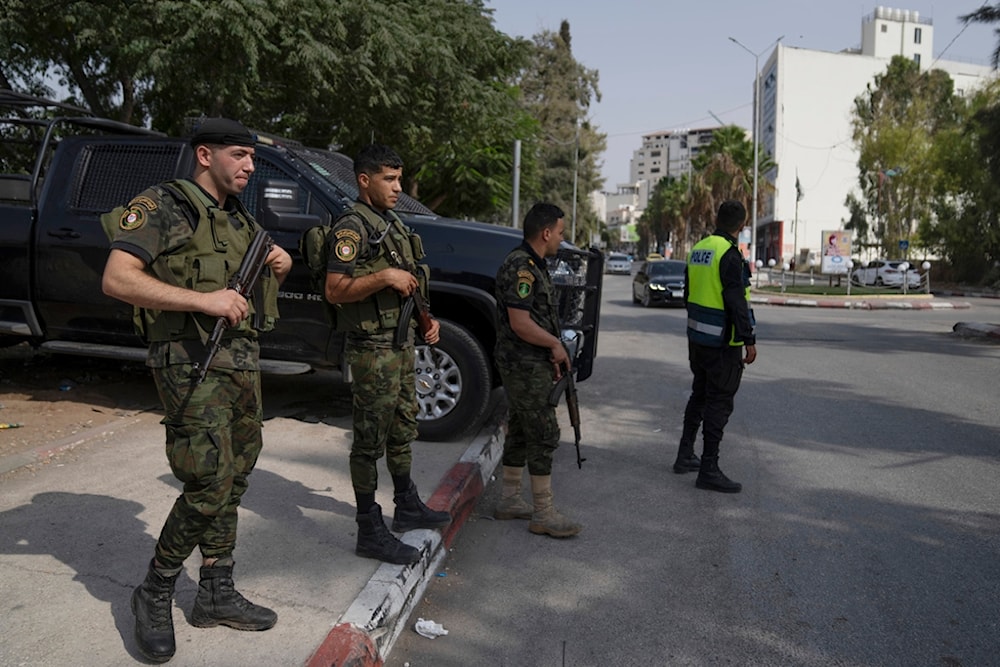Netanyahu attacks on PA grim sign of hostility toward Gaza, WB: Hamas
Hamas underlines that Israeli Prime Minister Benjamin Netanyahu underlined his hostility toward the people of Gaza and the occupied West Bank.
-

Palestinian security forces newly deployed in the city of Jenin are seen stationed at main junctions in the occupied West Bank city of Jenin, occupied Palestine, August 13, 2023 (AP)
The Palestinian Hamas Resistance movement said Tuesday that the statements of Israeli occupation Prime Minister Benjamin Netanyahu regarding his readiness to attack the Palestinian Authority (PA) affirm that he intends to attack all walks of Palestinian life, whether in Gaza or the occupied West Bank.
According to Hamas, Netanyahu's statements underline his "disregard" for the political settlement and his efforts to deeply anchor the Israeli occupation, especially in occupied al-Quds and al-Aqsa Mosque.
Hamas also called on the Palestinian Authority and its institutions to "circumvent the Oslo Accords, stop security coordination, and move toward comprehensive resistance."
Netanyahu said earlier on Tuesday that "Israel" was preparing for the possibility of "waging war" against the security forces affiliated with the Palestinian Authority amid discussions about concessions to the Palestinians and dealing with bringing Palestinian workers to "Israel."
In a closed discussion held in the Foreign Affairs and Security Committee of the occupation, Knesset members asked Netanyahu about the possibility of an alternative scenario wherein the Palestinian Authority's security forces would aim their rifles at the occupation forces in the West Bank, as part of possible cooperation with Hamas.
Netanyahu, according to Israeli Channel 2, said the "coup scenario is familiar and is up for discussion," adding that in the case this scenario is realized, the IOF would respond within minutes.
Oslo Accords were a 'disaster'
In the discussion, Netanyahu said, "The Oslo Accords were a disaster that resulted in the same number of casualties as the October 7 attack but over a longer period."
"The Oslo Accords are a fundamental mistake; they caused the largest number of casualties," he said in reference to the agreement signed between the Israeli occupation and the Palestinian Authority under the auspices of the United States.
Israeli Prime Minister Benjamin Netanyahu said Monday during a discussion of the Foreign Affairs and Security Committee that he was opposed to the Palestinian Authority taking control of the Gaza Strip after the aggression ends, the Israeli Maariv newspaper reported.
"The Palestinian Authority will not be able to control Gaza under any circumstances," the Israeli premier maintained.
"Security responsibility will remain under the State of Israel. The difference between Hamas and the Palestinian Authority is only that Hamas wants to destroy us here and now and the Authority wants to do it in stages," he said despite the PA being recognized by the Israeli occupation as a representative of the Palestinian people.
Meanwhile, Knesset Member Merav Michaeli claimed that there needs to be a "political vision" alongside military action.
Another MK, Tali Gottlieb, argued that there cannot be "a political vision with terrorists," in clear reference to the Palestinian Resistance.
When the chairman of the committee, MK Yuli Edelstein, brought up the issue of the Israeli captives taken by the Palestinian Resistance, something that is highly contentious for Netanyahu and has been causing him countless issues on the home front, the premier dismissed his words, and said the meeting was "not the forum to talk about this."
The Netanyahu government has been met with a resounding failure when it came to freeing the captives taken by the Resistance military and has solely been able to bring back those the Resistance offered in a prisoner swap.
Netanyahu's assertions do not go in line with those of his Security Minister. Security Minister Yoav Gallant said Monday that the Israeli occupation does not plan on maintaining a permanent foothold in Gaza, saying "Israel" was open to discussions about who should be the alternative to ruling the Strip so long as it is not an anti-Israeli party.
Gallant also claimed that the occupation was open to the possibility of reaching a deal with Lebanon so long as that accord included a safe zone alongside the Lebanese-Palestinian blue line and appropriate guarantees from the Lebanese side.

 4 Min Read
4 Min Read








